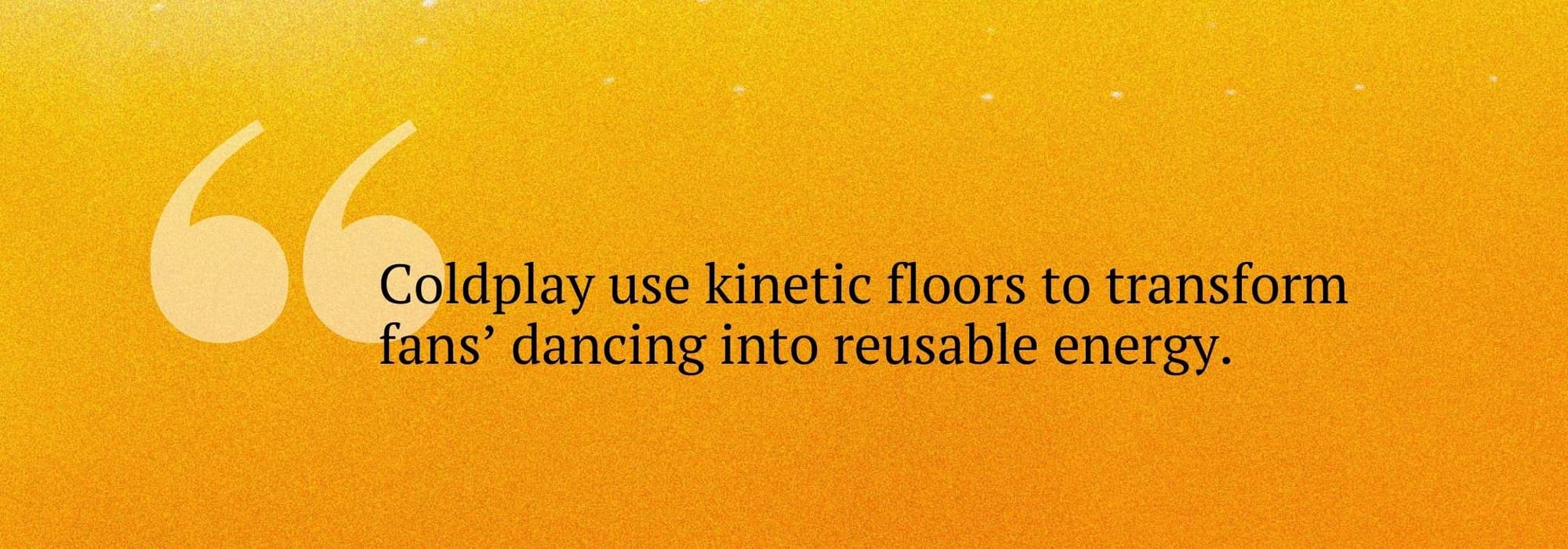Experiencing your favourite music in person is truly memorable, but we can’t forget the impact the live music industry has on the environment – so what’s being done to minimise the damage?
One of my earliest experiences of live music was back in the 90s, watching the Spice Girls perform their hits to a crowd of screaming teenage fans. More than 20 years later, I still tap my foot when ‘Say You’ll Be There’ comes on the radio, and I’m more convinced than ever that gigs are an absolute cornerstone to my wellbeing.
The emotional comfort that comes from hearing live renditions of songs that have helped me through hard times is unmatched, as is the adrenaline that runs through a crowd when a musician teases the opening bars of a popular tune. But the uncomfortable truth about the ballooning market (the UK live music sector spending reached an all-time high of £6.1bn in 2023) is that the industry’s environmental impact is significant.
From the single use plastic and abandoned festival tents that end up in landfill, to the tonnes of carbon emissions generated by transport, stage setups, and merchandise production, the post-pandemic spike in live gigs has come with consequences.
But there are a handful of artists making changes to how they tour, and the results are inspiring.
Planting for the future
Billie Eilish has long been a spokesperson for environmental issues, and alongside the support of her mother, Maggie Baird, has made significant moves to make her live tours as sustainable as possible. Back in 2022, Billie partnered with Support + Feed (founded by Maggie) to address climate change and increase food security by encouraging plant-based food options at her concerts. As a result, according to the secondhand instrument site REVERB, Billie’s 2022 tour saved 8.8 million gallons of water by serving plant-based meals to both artists and crew.
Similarly, in June 2025, Massive Attack had a full vegan menu on offer at their Manchester show, held at the Co-op Live Arena. The arena, which is powered by renewable energy, is an industry-leader in terms of commitment to sustainability – it already focuses on locally sourced construction materials and food, uses rainwater for flushing toilets, and is planting trees, shrubs, and wildflowers to create a habitat for local wildlife.
Minimising waste
If you’ve ever waded through a sea of plastic cups after the lights come up, then you’ll know first-hand that waste is a huge problem for the live music industry. That’s why artists like Coldplay now encourage fans to bring reusable water bottles, and provide refill stations at every venue.
The band made public sustainability commitments back in 2022, and, now, all merchandise is made using natural fibers, recycled elements, and packaged in eco-friendly materials where possible. If you’re lucky enough to attend a Coldplay show, you’ll also be invited to hand back your LED wristband for recycling.
More recently, Billie Eilish challenged her label to make use of 400,000 unsold T-shirts, which have been upcycled into new merchandise – an approach that her label estimates is one of the most ambitious upcycling projects ever undertaken by an artist. Billie also donates excess catered food, hotel toiletries, and camping gear left behind by fans.

On the move
A 2021 report from the European Federation for Transport and Environment found that private jets are five to 14 times more polluting per passenger than commercial flights, and 50 times more polluting than trains. For that reason, Coldplay opt for commercial flights where possible, and use sustainable aviation fuels.
Meanwhile, indie-pop band The 1975 switched to using vegetable oil to power not just their tour buses, but their equipment, too. This cleaner fuel source reduces the carbon footprint when compared to traditional diesel.
Live events host thousands of fans who often require transport to attend. One analysis, published in the Journal of Tourism Studies, found that 80% of Coachella festival’s carbon emissions come from attendees’ travels.
Massive Attack addressed this issue in a one-off gig in Bristol back in 2024, minimising audience travel by offering presale tickets to locals, incentives for those using public transport, and free electric shuttle buses to the venue.
Coldplay even created a custom-made app for their most recent tour, which advises on low-carbon transport options, and rewards fans for choosing greener methods. And to make the most of the huge fanbase in attendance, they even have specific energy zones in each venue that use kinetic floors to transform fans’ dancing into reusable energy.
As well as avoiding unnecessary waste, water use, and carbon emissions, these practical changes are taking place on a global stage. To see major artists taking responsibility for their impact on the planet isn’t just effective, it’s a template that the wider industry can learn from.
Through creative solutions and conscious choices, these musicians are rewriting the rules of touring, proving that caring for the environment can amplify, rather than diminish, the magic of live music.


Comments